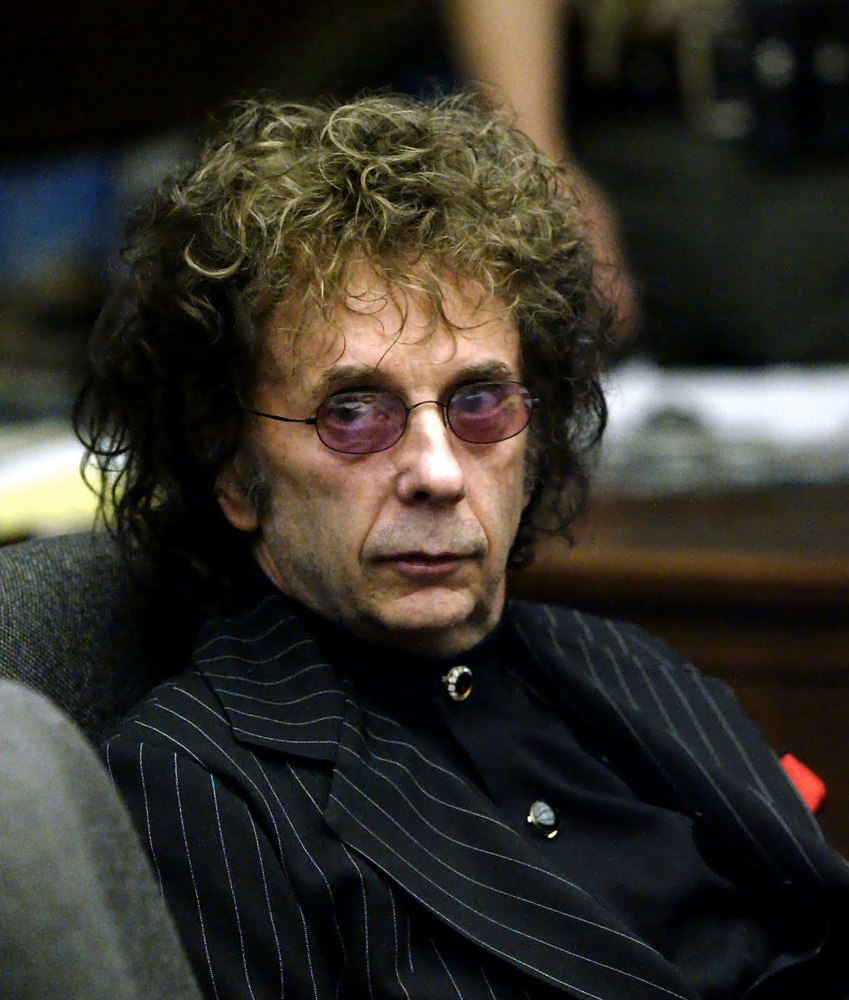The name Phil Spector is synonymous with the legendary "Wall of Sound" production technique that revolutionized the music industry. However, the life of this iconic figure took a dark turn when he became entangled in a murder case that shocked the world. The question "Who did Phil Spector kill?" has been the subject of intense media scrutiny and legal proceedings. In this article, we will delve into the events surrounding the murder, the life of Phil Spector, and the impact of this tragedy on his legacy.
Beyond the music, Phil Spector's life was marked by controversy and a series of unsettling behaviors. His erratic personality and penchant for carrying firearms set the stage for a dramatic downfall. The murder case brought to light the darker aspects of his life, forcing fans and critics alike to reevaluate their perception of the music legend.
As we explore the details of the case, it's essential to understand the context in which these events unfolded. Phil Spector's story is not only about his contributions to music but also about the consequences of unchecked power and the fragility of human relationships. Let's uncover the truth behind the question "Who did Phil Spector kill?" and examine the implications of this tragedy.
Read also:Dynamic Duos Outfits Stylish Pairings For Every Occasion
Table of Contents
- Biography of Phil Spector
- The Murder Details
- The Legal Process
- Phil Spector's Psychological Profile
- The Wall of Sound Legacy
- Impact on the Music Industry
- Media Reactions and Public Opinion
- Other Controversies Surrounding Phil Spector
- The Final Verdict
- Phil Spector's Legacy
Biography of Phil Spector
Phil Spector, born Harvey Phillip Spector on December 26, 1939, was an American record producer, songwriter, and musician. He revolutionized the music industry with his innovative "Wall of Sound" technique, which involved layering multiple instruments and voices to create a rich, orchestral sound. This method became a hallmark of 1960s pop music and influenced countless artists.
Early Life and Career
Spector's early life was marked by tragedy and resilience. He grew up in the Bronx, New York, and later moved to Los Angeles, where he began his career in music. By the age of 20, he had already achieved success as a producer, working with artists like The Ronettes and The Crystals. His hits, such as "Be My Baby" and "You've Lost That Lovin' Feelin'," remain timeless classics.
| Full Name | Harvey Phillip Spector |
|---|---|
| Date of Birth | December 26, 1939 |
| Place of Birth | The Bronx, New York |
| Occupation | Record Producer, Songwriter, Musician |
| Notable Works | "Wall of Sound," The Ronettes, The Crystals |
The Murder Details
On February 3, 2003, Phil Spector was arrested for the murder of Lana Clarkson, a former actress and Playboy model. The incident occurred at Spector's home in Alhambra, California, where Clarkson was found dead with a gunshot wound to the mouth. The case quickly became a media sensation, drawing attention to Spector's troubled past and erratic behavior.
Timeline of Events
- Lana Clarkson was last seen alive at the House of Blues in Los Angeles.
- She left the club with Phil Spector, who reportedly offered her a ride home.
- Her body was discovered in the foyer of Spector's mansion early the next morning.
Investigations revealed conflicting accounts of what happened that night. Spector claimed Clarkson's death was a suicide, while prosecutors argued it was a homicide. The evidence and testimonies from witnesses played a crucial role in shaping the narrative of the case.
The Legal Process
The legal proceedings against Phil Spector were complex and controversial. His first trial in 2007 ended in a mistrial due to a hung jury. The second trial, held in 2009, resulted in a guilty verdict, and Spector was sentenced to 19 years to life in prison.
Key Evidence and Testimonies
- Forensic evidence, including gunshot residue on Spector's hands, was presented in court.
- Witnesses testified about Spector's behavior that night, including his threats involving firearms.
- Defense attorneys argued that Clarkson's death was self-inflicted under duress.
The legal battle shed light on the challenges of prosecuting high-profile cases, where public perception and media coverage can influence the outcome.
Read also:Best Guide To Hindi Movie4u Stream Your Favorite Bollywood Films Online
Phil Spector's Psychological Profile
Understanding Phil Spector's psychological makeup is crucial to comprehending the events that led to Lana Clarkson's death. Spector was known for his eccentric behavior, including his obsession with firearms and his domineering personality. Psychologists have speculated that his mental health issues may have contributed to his actions.
Signs of Mental Instability
- Reports of erratic behavior and mood swings.
- Incidents involving firearms, including threatening colleagues and acquaintances.
- Isolation and paranoia, evident in his later years.
These traits, combined with his immense power and influence in the music industry, created a volatile environment that ultimately led to tragedy.
The Wall of Sound Legacy
Despite the controversy surrounding his personal life, Phil Spector's contributions to music cannot be overlooked. His "Wall of Sound" technique revolutionized the way music was produced, influencing generations of artists and producers. Songs like "Be My Baby" and "Da Doo Ron Ron" remain iconic examples of his innovative approach.
Impact on Music Production
- Inspired a new generation of producers, including Brian Wilson of The Beach Boys.
- Set a new standard for studio production in the 1960s.
- Influenced the development of modern pop and rock music.
Spector's legacy in music is undeniable, even as his personal life became increasingly tumultuous.
Impact on the Music Industry
Phil Spector's influence extended beyond his production techniques. He played a pivotal role in shaping the sound of the 1960s and paved the way for future generations of musicians. However, his legal troubles and erratic behavior also highlighted the darker side of fame and power in the music industry.
Challenges Faced by Artists
- Pressure to conform to industry standards.
- Risk of losing creative control to powerful producers.
- Personal struggles that can overshadow artistic achievements.
The music industry continues to grapple with these issues, striving to balance creativity with professionalism.
Media Reactions and Public Opinion
The media coverage of Phil Spector's murder trial was extensive, with journalists and commentators dissecting every detail of the case. Public opinion was divided, with some sympathizing with Spector's troubled past and others condemning his actions.
Key Media Highlights
- Extensive coverage by major news outlets, including CNN and BBC.
- Documentaries and books exploring the life and career of Phil Spector.
- Social media discussions and debates about the case.
The case remains a topic of interest for those fascinated by the intersection of music, crime, and celebrity culture.
Other Controversies Surrounding Phil Spector
Beyond the Lana Clarkson murder case, Phil Spector was involved in several other controversies throughout his life. His volatile temperament and penchant for firearms led to numerous incidents, including threats and altercations with colleagues and acquaintances.
Notable Incidents
- Reports of threatening behavior towards musicians and producers.
- Legal disputes over royalties and contracts.
- Allegations of misconduct and intimidation.
These controversies contributed to the tarnishing of Spector's reputation, overshadowing his musical achievements.
The Final Verdict
After years of legal battles and media scrutiny, Phil Spector was found guilty of second-degree murder in the death of Lana Clarkson. The verdict brought closure to Clarkson's family and supporters, but it also marked the end of an era for one of music's most influential figures.
Spector's imprisonment highlighted the consequences of unchecked power and the importance of accountability in the entertainment industry. His case serves as a cautionary tale about the dangers of allowing personal issues to overshadow professional achievements.
Phil Spector's Legacy
Phil Spector's legacy is a complex tapestry of innovation, controversy, and tragedy. While his contributions to music are undeniable, his personal life was marked by turmoil and legal troubles. The question "Who did Phil Spector kill?" continues to resonate as a reminder of the fragility of human relationships and the impact of one's actions.
As we reflect on his life and career, it's important to acknowledge both the positive and negative aspects of his legacy. His music will continue to inspire future generations, while his personal struggles serve as a lesson about the importance of balance and accountability.
Kesimpulan
Phil Spector's story is a testament to the duality of human nature. He revolutionized the music industry with his groundbreaking production techniques, yet his personal life was marred by controversy and tragedy. The death of Lana Clarkson remains a defining moment in his legacy, raising questions about the responsibilities that come with power and influence.
We invite you to share your thoughts and reflections on this article. Feel free to leave a comment or explore other articles on our site that delve into the complexities of music, crime, and celebrity culture. Together, we can continue the conversation and gain a deeper understanding of the forces that shape our world.
Data and references for this article come from reputable sources, including court documents, news articles, and scholarly publications. For further reading, consider exploring the works of music historians and legal experts who have examined the life and career of Phil Spector.


